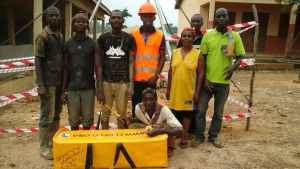Difference between revisions of "Modaso"
| Line 10: | Line 10: | ||
The FloFlo employs a hoist using a three legged tower. The drillbit is repeatedly hoisted and released to pulvarise the hard soil as it hits the ground. Once a substantial amount of soil has been pulvarised, the drillbit is replaced by the bailer, equiped with a valve, to pull out the soil. Thus it is a manpower driven drill tool. Anyone can do it, and it is cheap and efficient. | The FloFlo employs a hoist using a three legged tower. The drillbit is repeatedly hoisted and released to pulvarise the hard soil as it hits the ground. Once a substantial amount of soil has been pulvarised, the drillbit is replaced by the bailer, equiped with a valve, to pull out the soil. Thus it is a manpower driven drill tool. Anyone can do it, and it is cheap and efficient. | ||
| − | [[Image:01-FloFlo- | + | [[Image:01-FloFlo-c.jpg|thumb|left| The floFlo tower]] |
| − | [[Image:01-FloFlo- | + | [[Image:01-FloFlo-a.jpg|thumb|right| Bringing it on]] |
[[Image:03-Crew-b.jpg|thumb|left| Drilling crew in full gear]] | [[Image:03-Crew-b.jpg|thumb|left| Drilling crew in full gear]] | ||
[[Image:03-Crew.jpg|thumb|right| The crew]] | [[Image:03-Crew.jpg|thumb|right| The crew]] | ||
Revision as of 17:53, 8 September 2016
EcoSan Ghana drilled for water in front of a primary school in Modaso (Diaso), Ghana, using a FloFlo drill tower (percussion drilling).
The FloFlo
The FloFlo is an ancient drilling tool, modernised by dutchman Floris de Vos in 2011 (see Facebook page) The FloFlo employs a hoist using a three legged tower. The drillbit is repeatedly hoisted and released to pulvarise the hard soil as it hits the ground. Once a substantial amount of soil has been pulvarised, the drillbit is replaced by the bailer, equiped with a valve, to pull out the soil. Thus it is a manpower driven drill tool. Anyone can do it, and it is cheap and efficient.
.
The Start
Drilling started on August 16, 2016. Then on August 19 the kit holder got loose, which was fixed on august 20. On august 22 the drilling resumed. On September 2, the queen Nana Adjei Maanu and the odikro (elder of the village) stopped by for some encouraging words. That very same day, after 13 days of drilling, water was found, at 50 feet depth.
.
The Costs
It took 13 days of drilling. Each person was paid 50 cedi per day. So, 5 x 50 x 13 = 3250 cedi in total (which was about 740 euro at the time). Plus 50 cedi for fixing the bit holder. Plus transportation costs for the project manager and the floflo; 190 cedi. 10 cedi for a torchlight. 80 cedi for caution tape. Plus 150 cedi in total for the water used in the drill hole. 50 cedi for gloves. total costs: 3780 cedi. (860 euro)
















